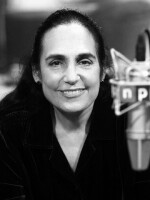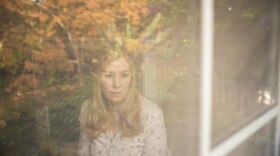If you live in New York City, you will often see the Orthodox Jewish ambulance service known as Hatzolah on the street. Hatzolah has some 1,200 volunteers — all men — in New York City and is known for its quick response time.
Now, a group of Hasidic female EMTs wants to create a women's division within Hatzolah, to help deliver babies in emergencies.
Deeply religious Hasidic men and women do not touch each other, unless they are immediate family. They don't shake hands. They don't sit next to each other on buses or at weddings. But when it comes to emergency births, the babies are often are delivered by male volunteers with Hatzolah.
When Rachel Freier — a Hasidic woman, lawyer, and mother of six — was first asked to come to a meeting of women who wanted to be EMTs with Hatzolah, her first thought was, " 'Who are these women? Are they these, like, women libbers? Because if they are I am out of here, this is not for me.' But I was curious. I was intrigued."
One of the women she met at this meeting had been trained during a brief period when Hatzolah was a young organization, some 40 years ago. But the women's division was disbanded in less than a year.
Modesty, Not Feminism
Freier also learned that there were some places, including New Square, the tiny, insular, Hasidic community north of New York City, where female EMTs are part of the corps.
The women at the meeting told Freier they wanted to help women in emergency labor. And she asked them, "Does that really happen? Do Hatzolah men actually deliver babies?" Yes, they said; in Brooklyn, about 100 babies a year are delivered by Hatzolah members.
For Freier the issue isn't feminism; it's modesty. Also, she noted, women have been midwives and labor coaches for thousands of years. "It's in the Bible, after all," she says.
Freier goes to a male OB-GYN.
So what's the difference?
She says she sees her doctor in his office or in the hospital, but if Hatzolah is called for an emergency delivery, a close neighbor could come, someone you see in the grocery store, or at religious services. In the ambulance you could be in the presence of four or five men.
For a women who is modest, says Freier, "where her body is always covered, where she grew up not having any physical contact with men, other than her immediate family, this can be traumatizing."
Members of Hatzolah have been told not to comment on this issue. A call to the head of the organization was not returned.
Response From Men
Binyamin Jolkovsky, a deeply religious Jew, is the editor-in-chief of Jewish World Review, which takes a very traditional perspective on contemporary events.
He says Hatzolah has some financial concerns given the recession. "Like [with] every other nonprofit [organization] across America, now is not the time to experiment."
And Jolkovsky says this is a job where there is a lot of stress and emotion that inevitably could cause bonding between men and women. So he says the belief in the Hasidic community is "that we [would] rather not create a scenario which could lead people astray."
But the women say they want a separate unit where men and women will not mix.
Yocheved Lerner has worked as an EMT for 14 years. She grew up in the secular world and became Hasidic later. She says there are more than 100 Hasidic women in Brooklyn who have some EMT or medical training.
But change is always difficult.
Lerner says, "And when the status quo is working, then why change? And there are always those who will say men do this kind of work, women don't."
But from a modesty standpoint, says Lerner, a women's division makes sense.
Marc Shapiro, a professor of Judaic studies at the University of Scranton, says most women in labor make it to the hospital. Emergency births are not that common, and not that many religious women have complained. So Hatzolah is not taking the issue seriously.
"Had this come from the rabbis then it would be a completely different situation," he says, but the fact that this came from women makes people think it's a ploy of some kind.
But Freier is clear: The idea is a good one. The only question, she says, is, "How can it be implemented in an organization which is running so well under a particular system for so many years?"
Rabbi Daniel Eidensohn, who runs the blog Daas Torah, says that modesty is a good thing, but saving a life is more important.
New Square is small; there are more complexities in a huge borough like Brooklyn — which has the highest birth rate in New York City.
Freier says she doesn't have a magic answer, but if people want solutions they will find a way. So the women and the rabbis will keep talking.
Copyright 2022 NPR. To see more, visit https://www.npr.org. 9(MDAzMjM2NDYzMDEyMzc1Njk5NjAxNzY3OQ001))







